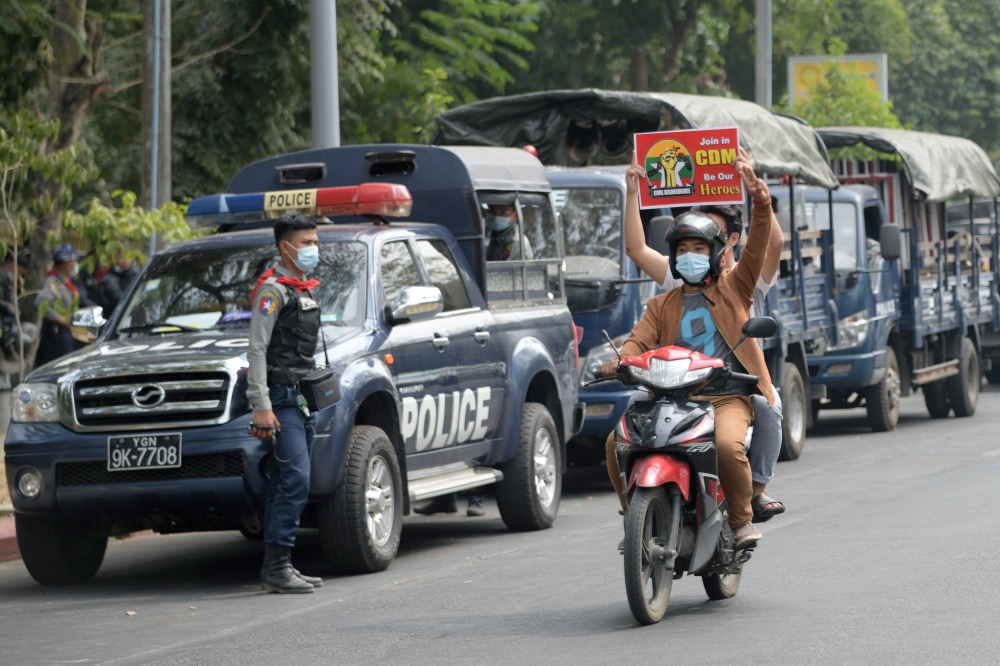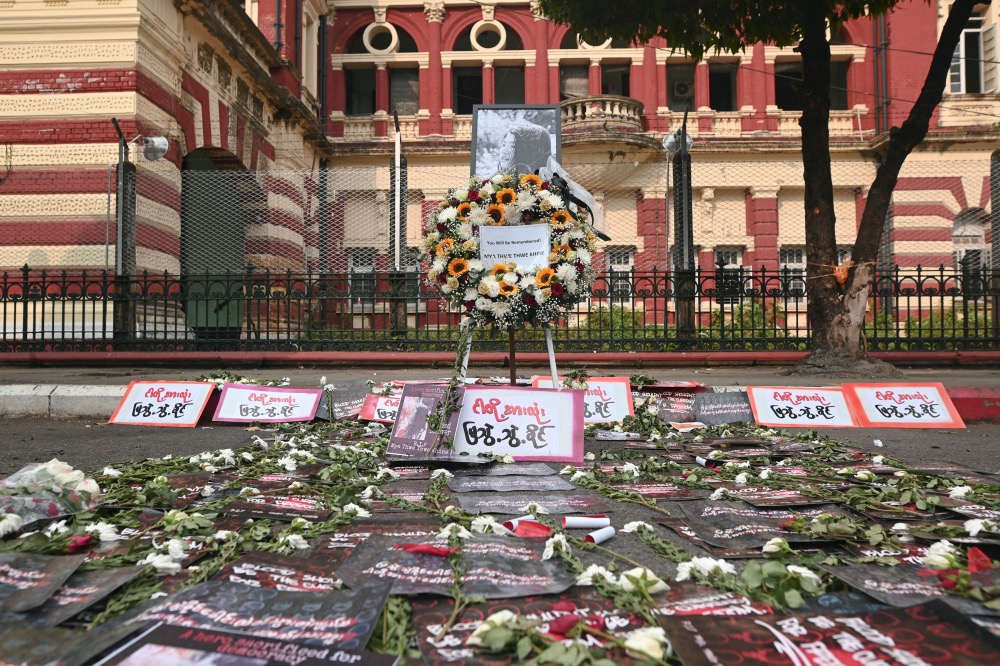Britain and Canada imposed sanctions on Myanmar’s ruling generals on Thursday for toppling the civilian-led government while Japan said it had agreed with the United States, India and Australia that democracy must be restored there quickly.
Western countries have condemned the 1st February overthrow and detention of elected leader Aung San Suu Kyi, which has also brought daily mass demonstrations to the streets of the South-East Asian country.

A demonstrator on a motorbike holds a placard while other demonstrator flashes the three-fingers salute as they ride past police officers during a protest against the military coup in Yangon, Myanmar, on 18th February. PICTURE: Reuters/Stringer
Following sanctions from the United States announced last week, both Britain and Canada announced measures.
Britain said it would impose asset freezes and travel bans on three generals while Canada said it would take action against nine military officials.
“We, alongside our international allies, will hold the Myanmar military to account for their violations of human rights and pursue justice for the Myanmar people,” British foreign minister Dominic Raab said.
Britain already had sanctions in place on junta leader Min Aung Hlaing, accusing him of human rights abuses against Muslim Rohingya and other ethnic minority groups.
Myanmar’s government made no immediate reaction to the new sanctions. On Tuesday, an army spokesman told a news conference that sanctions had been expected.
The coup halted a tentative transition to democracy that began in 2011 after nearly half a century of army rule, raising fears of a return to an old era of isolation despite the generals’ promise to hold fair elections.
Also on Thursday, Japanese Foreign Minister Toshimitsu Motegi said he had agreed with his US, Indian and Australian counterparts in the so-called Quad grouping that democracy must be restored quickly in Myanmar.
But the army has closer ties to neighbouring China and to Russia, which have taken a softer approach.
There is little history of Myanmar’s generals giving in to foreign pressure.
Protests and strikes
But they also face a challenge in the country of 53 million from protests that have drawn hundreds of thousands of people and strikes that have paralysed much government business.
“I don’t want to wake up in a dictatorship. We don’t want to live the rest of our lives in fear,” said Ko Soe Min, who was out in the main city of Yangon where tens of thousands took to the streets a day after some of the biggest protests yet.

Tributes to Mya Thwate Thwate Khaing, a teenager who was shot in the head when police cracked down on a protest against the military coup in Naypyitaw, are seen in Yangon, Myanmar, on 18th February. PICTURE: Reuters/Stringer
The marches have been more peaceful than the bloodily suppressed demonstrations seen during an earlier half century of army rule, but police have fired rubber bullets several times to disperse protesters.
One protester is expected to die after being shot in the head in the capital Naypyitaw last week. The army says that one policeman died of injuries sustained in a protest.
In the second-biggest city, Mandalay, protesters rallied on Thursday to demand the release of two officials arrested in the coup. Police fired water cannon in Naypyitaw to scatter a crowd approaching police lines.
Police and soldiers used catapults to break up a protest in the northern town of Myitkyina, a resident said.
In the old capital of Bagan, people with banners and flags marched in colourful processions against a backdrop of ancient temples. Some protesters stopped at a temple to put a curse on dictators, a witness said.
The army took power after the electoral commission rejected its accusations of fraud in a Nov. 8 election won by Suu Kyi’s National League for Democracy.
Suu Kyi faces a charge of violating a Natural Disaster Management Law as well as charges of illegally importing six walkie talkie radios. Her next court appearance has been set for 1st March.
Suu Kyi, 75, spent nearly 15 years under house arrest for her efforts to bring democracy and won the Nobel Peace Prize in 1991 for her struggle.
The number of people known to have been detained since the coup had reached 495 by Wednesday, of whom 460 were still being held, Myanmar’s Assistance Association for Political Prisoners said.






